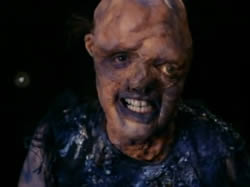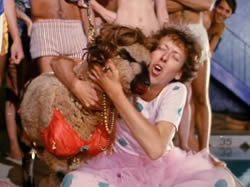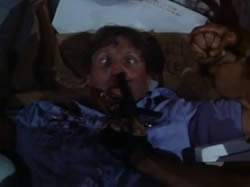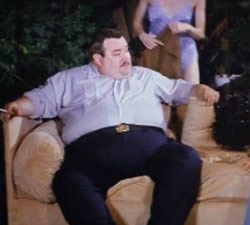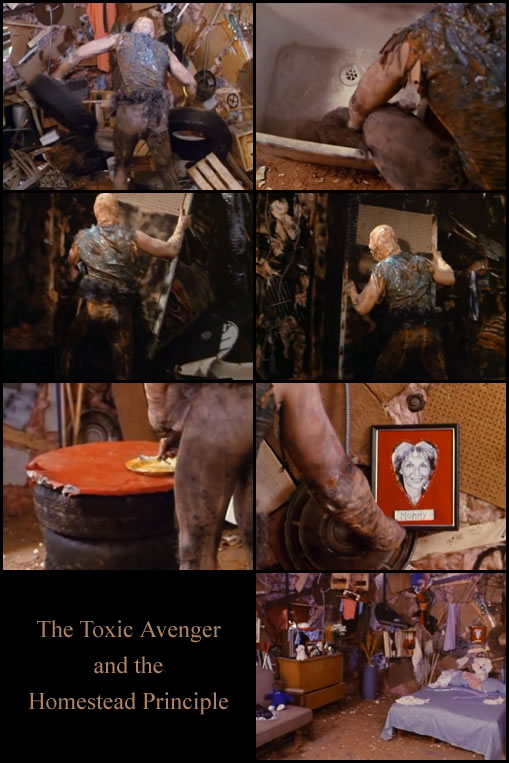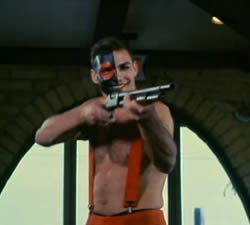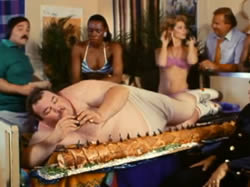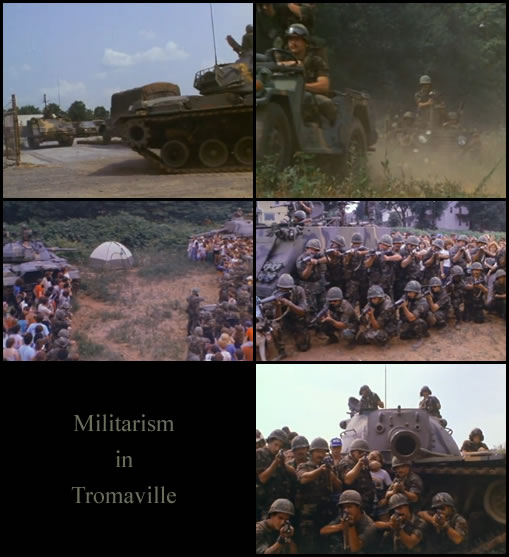The Toxic Avenger
Lloyd Kaufman and Michael Herz
May 1984
Mitch Cohen as the Toxic Avenger
Introduction
The Toxic Avenger is a campy libertarian horror comedy. It is also a cult classic.
Made in 1984 by the independent production company Troma Entertainment, a company known for its low-budget shocksploitation movies, The Toxic Avenger is set in the fictional town of Tromaville, New Jersey. Tromavilla has a population of 15,000, and is described as the toxic waste-dumping capital of the world. “Our story takes place at the Tromaville Health Club,” says the narrator, “where a young man named Melvin Ferd works. Melvin’s entire life—in fact, entire being—was changed by toxic chemical waste.” Ferd is a 98-pound weakling, and the janitor at a fitness centre called Tromaville Health Club.
Life, Liberty, and Justly-acquired Property
We are soon introduced to four rather nasty individuals—Bozo, Julie, Slug, and Wanda—who take pleasure in picking on little Melvin. Not long after, we discover that the four of them are actually murderers, who take pleasure in intentionally committing hit-and-runs while driving. “I love it when we go real fast and they never know what his them,“ explains Wanda to Slug. “I love the sound of breaking bones,” says Slug to Wanda. Julie shows a clear preference for murdering children under twelve, telling Bozo that they are “double points.” The audience is left with absolute disgust as these four take glee in their heinous hobby.
Murder is a violation of natural law. Every individual, regardless of race, gender, sex, orientation, or creed, has certain natural, innate rights, and these rights can all be derived from the fundamental right to self-ownership. Every individual owns her or his own body, where ownership is correctly defined as the authority to control a thing. When person A controls the body of person B, person A can be said to be guilty of enslavement, of usurping from B her right to control her own body. Likewise, every person owns the product of her or his own labour, assuming she or he did not aggress in order to acquire said product. Thus, every individual has a right to be secure in her own body and in her justly-acquired property.
Libertarianism is the philosophy that says that liberty—i.e., freedom from aggression—should be maximised. To better understand this, we must be clear that aggression does not mean violence per se, but rather refers specifically to the initiation of force or fraud against the person or the justly-acquired property of others. If person A starts pummelling person B, and person B fights back with equal and opposing force, we would not describe A and B both as aggressors; rather, we would refer only to A as an aggressor. The reason we do not refer to B also as an aggressor is that B did not initiate any force or fraud against anyone; B has merely engaged in self-defence, which is perfectly acceptable to most libertarians. (The only libertarians who do not find defensive force legitimate are the anarchopacifists like Robert LeFevre, but they arguably constitute only a small sliver of the libertarian movement.) The position that it is inherently criminal for any person or group of people to initiate force or fraud against the person or the justly-acquired property of others is called the nonaggression axiom.
Mark Torgl as Melvin Ferd
Every individual possesses the same innate rights. Wherefore I own my own body, I have the right to do with it as I please, with the sole exception being that I may not commit any action that infringes upon your right to your body or your justly-acquired property. Likewise, because you own your own body, you may do with it as you please, so long as you do not initiate force or fraud against my body or my justly-acquired property. Since murder is an activity that alters the state of the body of a human without the consent of said human, it can accurately be described as an usurpation of one’s natural, inalienable rights. It is only natural, therefore, that we would regard the actions of Bozo, Julie, Slug, and Wanda as unethical and heinous. If liberty is freedom from aggression, as I defined it above, then these four criminals can accurately be said to despise liberty.
Murder is not the only evil act these ethical nihilists enjoy. Back at the Tromaville Heath Club the next day, Slug places a snake down the back of the shirt of an exercise instructor without the instructor’s consent. By placing the snake down the back of the instructor’s shirt, Slug actively violates the natural right of the instructor to be secure in his person and his justly-acquired property. In short, Slug’s action constituted a criminal invasion of the instructor’s natural rights.
The Transformation
Still, the four remain preoccupied with tormenting poor Melvin. Julie cajoles Melvin into putting on a pink tutu by showing him her breasts, which itself is not technically unethical. Melvin winds up kissing a sheep in the dark, thinking it is Julie, and when the lights are turned on, Melvin is embarrassed to learn that a large number of people can see him with his arms around said sheep. Again, technically Melvin’s rights were not violated by Julie, although few would disagree with the claim that her actions were nasty. His rights were, however, violated by various persons in the crowd, persons who touch Melvin’s head and shoulders without his consent.
Melvin lands in toxic waste
The crowd follows Melvin, and Melvin decides to jump out of a window. As it turns out, a truck carrying toxic waste is parked just outside of the fitness centre. Melvin lands, head first, into a barrel of bubbling green toxic waste. The crowd gathers to point and laugh at Melvin as he writhes in pain. Melvin’s skin begins to burn, but Bozo assures Julie that he’s “faking it.” Presently, Melvin bursts into flames and runs off, as “Night on Bald Mountain” plays for the first of many times throughout the film. When all is said and done, Melvin is hideously disfigured, but extremely strong, and has a much deeper voice. He is now the monster hero we call the Toxic Avenger.
Punishment and Proportionality
The great Austrian economist Ludwig von Mises described the state as “essentially the negation of liberty.” Because libertarians want to see liberty maximised and aggression minimised, and since the state is an institution that necessarily employs aggression to achieve its ends, libertarians unsurprisingly dislike statism. Every person has a natural right to be secure in her or his body and in her or his justly-acquired property. Yet the state attempts to dictate what innocent people may or may not do with their own bodies. Thus, the state is a criminal organisation. Insofar as it attempts to prevent you from nonviolently spending or gambling your own money as you see fit, it is a criminal gang. Insofar as it attempts to prevent you from engaging in nonviolent prostitution and other forms of nonviolent sex work, it is usurping control over your body and rendering you a slave. Insofar as it steals the product of your labour, it is a band of thieves. Insofar as it aims to dictate what weapons you may use to nonaggressively defend yourself or what chemicals you may nonviolently consume, it is a criminal institution. If an organisation wishes to offer you something you desire in exchange for you conforming to its wishes, this is perfectly fine, for you are free to accept or reject the offer without fear of being aggressed against; the state, on the other hand, enforces its criminal edicts with the threat of violence. Should you fail to conform to the state’s arbitrary wishes, it will send armed thugs in blue suits with shiny badges who will threaten your very life. These thugs will either attempt to throw you in a cage, or will steal your justly-acquired property. More importantly, these thugs will have guns, with the tacit threat being that they will shoot you down in cold blood if you do not either conform or go unresistingly into your cage.
Hardcore libertarians argue that defence services can be more-effectively provided by private organisations operating on the free market than by some state monopoly. This view was first put forward by Gustave de Molinari in his 1849 work, The Production of Security. Hardcore libertarians maintain this because, after all, when crime rates rise under state monopoly, the public often cries out, “someone should do something about this!” and politicians, wanting to get more votes, see it fit to appropriate more funds to the state-monopoly police. Thus, when crime rates rise, police departments are likely to see their bottom-line go up, rather than down. The incentives under a monopoly system are precisely the opposite of what they should be. But let us imagine a scenario where we had eight or so different private protection companies competing for customers within a given city. Let us say you and your spouse have a subscription with protection agency A, and that you both have noticed that A does not offer very good service. Perhaps there has been a spree of break-ins recently, and A has proved rather unhelpful to those A-subscribing families that have been unfortunate enough to find themselves victims of said break-ins. Let us say you are sitting over the breakfast table with your spouse discussing this. Would you say to your spouse, “Honey, I think we should start giving a lot more of our money to our protection company”? Of course you wouldn’t. You would say, “Honey, I don’t have much confidence in A anymore. I was talking to Robinson next door, and he says his protection company, B, has really great service. B has been very successful in retrieving the stolen goods of its customers. Do you think, honey, that we should switch our subscription?” This market-based system of crime prevention would be infinitely more effective than the state-monopoly system precisely because it allows for the proper system of incentives. A government monopoly never has much incentive to do a good job because it is bound to get paid regardless of its performance; private firms operating on a purely free market, by contrast, must satisfy customers or risk losing said customers to some sort of competitor.
Libertarians also recognise that punishment must be proportional to the crime. If person A steals a hundred dollars from B or breaks B’s window, A owes restitution to B. B, as well as the protection agency she hires, has the natural authority to use force in order to obtain for B this restitution, but the force employed can never legitimately exceed that initiated by A. For example, if A steals a stick of B’s gum, it would be perfectly ethical for B to slap the gum out of A’s hands; nevertheless, it would be completely unethical for B to kill, or even to threaten to kill, the bubblegum thief. This is called the principle of proportionality.
Dick Martinsen as Officer O’Clancy
So, you may not ethically kill someone for taking your money, even though you may use nonlethal force against such a person in order to obtain restitution. But what if someone is trying to commit a murder? Do you, in this scenario, have the authority to use lethal force in order to stop the person? While the anarchopacifist would undoubtedly say no, most libertarians would say you do (as long as you are only using force against the murderer, of course, and not against someone else, such as the murderer’s son).
Since taxation is forced expropriation, government-monopoly police are technically persons who profit from theft. Thus, all government-monopoly cops are, by definition, criminals. Not all government-monopoly cops are murderers, however. While some cops are indeed murderers, and deserve to be treated as such, it is never wise to execute a cop merely on the assumption that he or she is a murderer. Likewise, we cannot even assume that every government-monopoly cop we encounter enforces the various unjust edicts of the state apparatus. But, since the state-monopoly police officer is definitely paid with stolen money, it is not unreasonable to point out that state-monopoly cops owe restitution to their victims.
It is important that this is all clear, for we presently find the film presenting us with a scenario involving a government-monopoly cop.
We see a gang of three men counting money in Chinbone Alley, money which they wish to give to a cop named O’Clancy. The three men are named Knuckles, Nipples, and Cigar Face, the latter having earned his name because of his affinity for burning people’s faces with cigars. Cigar Face is about to murder O’Clancy, when our deformed hero steps out of the shadows and defends O’Clancy’s life using lethal force.
Now we must ask ourselves: Was it right of the Toxic Avenger to defend the life of the criminal O’Clancy, and to use lethal force in pursuit of this goal? I say yes. Firstly, the film gives us no indication that O’Clancy has ever murdered or even threatened to murder anyone. Secondly, the film does not even give us any reason to assume that O’Clancy even makes the least bit of effort to enforce the state’s various criminal edicts. Perhaps O’Clancy is a cop that only makes an effort to punish rapists, thieves, and murderers, realising that it is better to go after real criminals than to go after prostitutes, gamblers, nonviolent gunowners, or nonviolent drug-users. Thus, thirdly, the only crime we can be sure O’Clancy is guilty of is knowingly profiting from theft. Since it is never legitimate to murder or torture a man whose only known crime is theft, we can conclude that the gang had no authority whatsoever to torture or attempt to kill O’Clancy. And since O’Clancy’s would-be murderers were not attempting to exact justice, but were instead attempting to act in defiance of justice, it was perfectly ethical for the Toxic Avenger to use equally-lethal force in order to defend O’Clancy’s life.
Pat Ryan Jr. as Mayor Peter Belgoody
The Political Class
The sociologist Franz Oppenheimer, in his classic The State, described the existence of two classes. The first is comprised of those individuals who aim to achieve goals through voluntary interaction, which he chose to call the economic class. The second was a class comprised of all exploiters, who use aggression, either directly or indirectly, to achieve their goals; he called this one the political class. While the economic class would include merchants, businessmen and women, unions that eschew statist assistance, workers, traders, farmers, private teachers, and many others, the political class would include government-monopoly police, government-monopoly judges, state teachers, those farmers who seek subsidies from the state, those firms that seek bailouts and subsidies from the state or that seek to use statist aggression to restrict competition, government unions, and of course bureaucrats and politicians. In a very real sense, the political class lives at the expense of the economic class.
While the terms political class and economic class originated with Oppenheimer, the conception of this class struggle is much older, originating with the French classical liberals Charles Comte (no relation to Auguste Comte) and Charles Dunoyer.
It is after the Toxic Avenger begins fighting crime that we are introduced to the film’s primary villian, a politician named Peter Belgoody. The evil Belgoody has no qualms with ruling over innocent subjects and subjecting them to dangers for his own economic benefit. If anything, he gets pleasure out of the idea of endangering others needlessly. Belgoody also reveals that, in addition to being a man who lords over the innocent people of Tromaville in his “official” capacity as mayor, he also was the boss of the violent, murderous thugs known as Knuckles and Nipples. This man is truly a scumbag.
Homesteading
Libertarians understand that, while property rights are important and ought to be defended, not all claims to property are legitimate. For example, when a politician claims the authority to take the product of your labour and call it his “property,” be not surprised when the libertarian rejects that claim as being fanciful at best. So then, how do we distinguish whether a given property claim is or is not legitimate?
Before humans come along, the land and other resources are in a state that John Locke describes as the “State of Nature.” Land, and other resources, cease being in this state of nature when one or more persons mix their labour with the resource to make something more out of it than used to be there before. This is called homesteading. For example, let us say you find an unowned field. You decide that you want to farm this land, and so you begin by clearing the twigs and stones and other things. You toil to get the soil ready, and are about to plant. Is this land you are about to plant yours, or is it unowned? It is yours precisely because you have mixed your labour with the soil. Thus, if I were to walk onto this field and begin spreading salt, you could justly call me an invader and an usurper, a man violating your property rights.
Legitimate property (as opposed to illegitimate property claims) can only be acquired in three ways: (A) through homesteading something unowned, (B) through receiving a piece of property from a previous just owner as a gift, or (C) through receiving a piece of property from a previous just owner through trade. All other property claims are, thus, illegitimate, even if it is the state making the claim. States have no magical “right” to unearned property merely by being so mighty.
Although all three of these methods of acquiring property are legitimate, few films show the first method. The Toxic Avenger is one of the few that does.
After the Toxic Avenger realises that his appearance scares his mother too much for him to return home, he decides to make a new home for himself. Thus, he goes to an unowned piece of land where chemical waste and other things are typically dumped, and he homesteads said land about a half-hour into the film, building a home for himself out of the discarded waste.
More Aggressors Emerge
Three violent thugs—Leroy, Rico, and Frank—burst into a restaurant, threatening the lives of its patrons with deadly weapons. When a person threatens another person’s life with a gun, you have every right to use lethal defensive force. Unfortunately, Leroy decides to have some “fun” and shoots an innocent man in the chest, presumably killing him. Then he jokingly claims that he was merely engaging in “self-defence,” all the while grinning in ecstasy from his evil deed.
Next we are introduced to a blind woman named Sara. Leroy proceeds to kill her seeing-eye dog, Gary. With a crazed look in his eyes, Frank is just about to rape the innocent Sara when, luckily, the Toxic Avenger arrives to save the day. Suffice it to say, the aggressors get their just deserts.
At Sara’s request, the Toxic Avenger leads her out of the restaurant, and back to her place. The two eventually fall in love.
The Scientist
A scientist named Dr. Morton Snodburger explains to an audience that it is “highly probable that this monster may have developed a very basic instinct which draws him—or, should I say, commands him—to destroy evil!”
Pat Kilpatrick as Leroy
It is rather interesting to notice that the Toxic Avenger in this movie never goes after nonviolent gamblers, nonviolent tax evaders, nonviolent prostitutes, nonviolent gunowners, or nonviolent drug users. We only ever see him going after those who employ aggression, such as politicians, street thugs, and those who work for the politicians or street thugs. The viewer can reasonably assume, therefore, that every person we see the Toxic Avenger attacking is guilty of either rape, attempted rape, murder, attempted murder, theft, or enslavement—i.e., real crimes. While drug use does not inherently violate natural law, being an agent of aggression does. Thus, it is reasonable to extrapolate that when the scientist says that our hero has an instinctual drive to destroy evil, what Dr. Snodburger is literally saying is that our hero has an instinctual drive to eliminate aggression. And since freedom from aggression is liberty, we can accurately say that the Toxic Avenger’s main drive in this movie is to maximise human liberty. In short, the Toxic Avenger is a libertarian superhero in this film.
The Toxic Avenger Continues to Fight Evil
The Toxic Avenger does not stop there. After executing the murderous Wanda, the Toxic Avenger is standing in an alley peeing as a limo pulls up. The man in the limo offers the Toxic Avenger the opportunity to have sex with the woman seated next to him. Now, there is nothing unethical about voluntary prostitution for, after all, the woman should be free to decide what she does with her own body. (This position is often summed up with the slogan, “My body, my choice!”) But forced prostitution, on the other hand, is never ethical, and for precisely the same reason: every person should be free to decide what she or he does with her or his own body.
If the woman in the limo were a willing participant, there would be nothing unethical about the man’s offer. But, the woman is clearly not a willing participant in this case, for she cries out for help. “No. No! Take me home—no! Take me home. No!” she says, as the man drags her unwillingly toward the Toxic Avenger. Thus, she is not a sex worker, but rather a sex slave.
Not only is the man guilty of enslavement, but he is also guilty of committing fraud. He says to the Toxic Avenger, “Only twelve years old, and only twelve dollars.” This is clearly a lie, for there is no possible way the woman is that young. Thus, not only has this man aggressed against this innocent woman by enslaving her, he has also aggressed against the Toxic Avenger by committing fraud. And so, the Toxic Avenger proceeds to fight the slavemaster. Presently, a group of men sympathetic to the slavemaster attack the innocent Toxic Avenger, and thus he proceeds to defend himself with equal and opposing force.
“And you can tell all of your scum friends that things are going to change in this town,” says the Toxic Avenger when he is complete, “I’m not just another pretty face!”
The next day, the Toxic Avenger saves two kids from being run over by Bozo and Slug. Later, he helps an old woman cross the street. Still later, he assists a woman in opening a jar of corn kernels, which magically turns into a jar of popcorn upon being opened. And still later, he hands a baby to a woman.
Mayor Belgoody gets a massage
The good people of Tromaville begin to recognise that the monster is a bona fide hero. The Toxic Avenger commits so many good deeds, in fact, and enacts so much vigilante justice that the politician Peter Belgoody decides that he and his henchmen must murder the innocent Toxic Avenger.
The Toxic Avenger then executes the evil Julie. Meanwhile, Slug and Bozo beat up an old woman, probably killing her in the process, and steal her car. When the Toxic Avenger shows up, the two attempt to run him over, but he jumps on top of the vehicle. He subsequently throws Slug from the vehicle, presumably thereby executing the murderous Slug. While attempting to escape from his just deserts, Bozo unfortunately causes a great deal of property damage, but luckily he does not run over any humans in the procees. The car goes flying off a cliff and bursts into flames. The Toxic Avenger survives the crash, but Bozo does not. Now, all four of Melvin’s murderous original tormentors are dead.
Old Women Can Be Evil, Too
Everything is going fine for our monster hero. But then, one day, he kills an old woman named Mrs. Haskell. Has the Toxic Avenger violated the libertarian code of ethics? Has he, as The Record alleges, killed an innocent woman?
Fortunately, no. As it turns out, that little old lady was the head of an international white slavery ring. Alas! the Toxic Avenger’s libertarian credentials stand unblemished.
Nevertheless, the public is uninformed. It does not know of Mrs. Haskell’s evil deeds, and the politician wants to keep it that way so that he can use the public outrage to assist him in ridding the world of the Toxic Avenger. “We’ve got to cover this up,” Belgoody says to his German chief of police, referring to the vile nature of Mrs. Haskell; “if it ever gets out to the press, we’re sunk! Now I want you to do me a favour: kill that bastard for me, y’got it? Kill him!”
“Yes, mein Führer—uh, mein Mayor!” responds the chief of police. Moments later, the evil politician holds a press conference in which he lies to the public, describing the Toxic Avenger as a public menace and as “an ‘it’” as opposed to a person.
The Evil of Government Licensing
Still, there are obviously various people in the community who know that the Toxic Avenger is a good guy. Many of these people were saved by the Toxic Avenger.
“That monster saved my life,” one teen named Johnny says, “and he’s done a lot of other good for this town; why are they going to kill him!? We should speak out—do something. Roy, why don’t you do something—speak out!?”
Roy is a business owner, and unfortunately the evil state apparatus assumes for itself the power to shut down any business that it doesn’t “license.” Thus, Roy responds, “You want me to speak up? If I speak up, I lose my business license!” In short, the state forces Roy and other business owners to conform, lest the state sends armed thugs with shiny badges to violently prevent voluntary commerce. The state is a powerful and oppressive institution indeed.
The Evil of Deference to Illegitimate Authority
The only legitimate authority that exists is the authority of the individual over her own body and over her own justly-acquired property. Whenever any person or group of people exerts authority over the bodies and the justly-acquired property of others, the person or group exerting this authority is acting in an authoritarian, and thus illegitimate, manner.
But many people pay deference to authoritarian figures and institutions. In fact, in the sixteenth century, the French philosopher Étienne de La Boétie wrote his Discourse of Voluntary Servitude, in which he questioned why exactly it is that so many people submit themselves to the illegitimate authority of tyrants.
The despicable government employee named O’Clancy exemplifies this irrational deference in his response to young Johnny: “Listen Johnny, you’re just a kid. People can’t go around doing things just because they’re right; we have to leave these decisions up to the mayor, and the police chief.” He goes on to add, “Us little guys are just not qualified to make these decisions. That’s why he’s the mayor!”
Truly, truly despicable.
Government Thugs Crack Down
When the Toxic Avenger and his girlfriend, Sara, are spotted in a field near Miller’s farm, the politician sends for the National Guard to come out “in full force.”
Here we see militarism on display. Tanks and other military vehicles roll down the streets of Tromavilla as the government thugs close in on our hero.
Johnny sees the fascistic display as he sits on his front step. “They’re gonna nuke ’im. They’re gonna nuke the monster!” he cried out in horror.
Mass Resistance to the State
Luckily, the good people of Tromaville gather in the field near Miller’s farm. They come to stop the mayor from murdering the innocent Toxic Avenger and his innocent, blind girlfriend, Sara.
The police and the military have their guns and artillery pointed at the tent in which the Toxic Avenger and his girlfriend sit. Plans are to murder the Toxic Avenger as soon as he exits the tent. But, the plans fail, for the good people of Tromaville, lead by Johnny, rise up and stand between the government thugs and their target. Even the despicable Officer O’Clancy nobly refuses to fire, becoming a conscientious objector. After O’Clancy refuses to fire, other cops and the entire military also lower their weapons, thereby engaging in mass civil disobedience against the commands of the state apparatus. It’s beautiful!
But the evil Belgoody still wants the Toxic Avenger dead, so he says, “Fine, I’ll do it myself,” while aiming his handgun at the innocent Toxic Avenger. But just as he is about to fire, O’Clancy again engages in an act of civil disobedience, pushing the evil mayor’s hand so that the shot would miss our monster hero. Belgoody’s response, not surprisingly, is to threaten O’Clancy’s life. The politician then shoots at the Toxic Avenger five times, but fails to inflict any harm. The Toxic Avenger, meanwhile, advances toward the politician, and executes him, tearing out his guts.
The Toxic Avenger and Sara
Thus we have a happy ending for the good people of Tromaville. Their tyrant is dead, and the crowd is happy.
Sequels
Thus far, three Toxic Avenger sequels have been made, although none as good as the original. They even change the name of the main character from Melvin Ferd to Melvin Junko. While the third movie does feature a cool battle between the Toxic Avenger and Satan, these sequels do not have much more to offer.
Watch the Movie Here
Watch the Trailer Here
